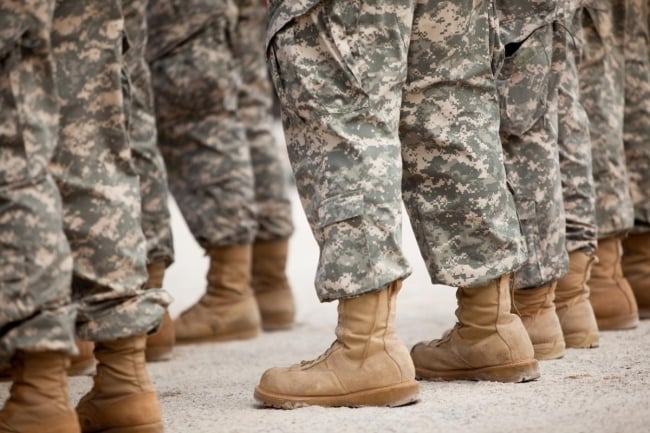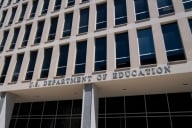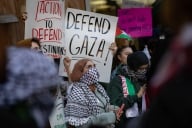You have /5 articles left.
Sign up for a free account or log in.

istock.com/MivPiv
Hundreds of National Guard troops rolled onto the West Chester University campus June 4 following an order from Pennsylvania governor Tom Wolf.
West Chester’s campus is about 30 minutes outside Philadelphia, where thousands of people had gathered to protest police brutality and systemic racism. Wolf mobilized the National Guard after protests on some nights coincided with vandalism and looting in the city.
Many West Chester students, faculty and alumni immediately pushed back, and a day later Wolf removed the troops. Their stay at the university was brief, but the situation raised a question that is rarely discussed in higher education: What power, if any, does a public university have to refuse to support the National Guard?
The answer is very little.
The issue of the National Guard on college campuses has been fraught since the Kent State shootings in 1970, when Ohio National Guard troops opened fire on student anti-Vietnam War protesters at Kent State University, killing four students and wounding nine.
Housing troops on a university campus is not a common issue in higher education law, said Bryan Heckenlively, a lawyer based in California who specializes in higher education. The Third Amendment of the U.S. Constitution prohibits quartering troops in private homes, and “lower courts have said specifically that the Third Amendment bars states from requiring you to quarter National Guardsmen" in your home, he said.
“As you can imagine, this never comes up, and the Supreme Court has never had a case about it,” he said.
But West Chester University is not a private home, it’s a public institution. Therefore, it must comply with the governor’s orders, said Nancy Gainer, a spokesperson for the university.
Approximately 312 Pennsylvania National Guard troops set up in West Chester’s Sturzebecker Health Science Center, an academic building and gymnasium. They brought their own equipment and did not use any university residence halls, Gainer said.
University facilities have in the past been used by the state for emergency management and disaster relief efforts.
“It is understood that the University, as a state agency, is to respond to the Pennsylvania Emergency Management Agency (PEMA) when needed,” Gainer said in an email. “The University provided relief during Hurricane Sandy, the displacement of individuals as a result of the fire at Barclay Friends senior living community, and similar disasters.”
The Pennsylvania State System of Higher Education gave a similar explanation for the National Guard’s presence on campus.
“West Chester University, as is true for all State System institutions, are state-owned, and their campuses are available to the Commonwealth during times of need,” a statement by PASSHE read. “Governor Wolf moved May 30, 2020, to allocate resources, including the Pennsylvania National Guard, to help protect the safety of peaceful demonstrators and the communities in which these historical events took place, and as part of his emergency declaration, the resources of the Commonwealth, including the West Chester campus, were utilized in this effort.”
Amid the coronavirus pandemic, West Chester’s campus was unusually empty. It’s unclear whether troops would have been ordered to campus in different circumstances.
The governor’s office did not respond to multiple requests for comment.
Many West Chester University students, faculty members and alumni did not believe the troops were there to protect protesters and communities, like PASSHE said in its statement. Curry Malott, an associate professor of educational foundations and policy studies at West Chester, said students and faculty members immediately contacted the university administration and the governor’s office to oppose the troops’ stay on campus.
“Many, many WCU students and alumni were outraged that their public university was being used to stage a military assault on people exercising their First Amendment rights,” Malott said in an email. “Some faculty opposed the military presence on campus because of the negative impact on creating a positive campus climate. Others were sickened that a public university that has expressed support for the movement for Black lives would at the same time be used to support the forces deployed to facilitate in the destruction of that same movement.”
Prior to this, Malott did not know of “any other instances where WCU was used as a military staging ground to suppress a popular uprising against systemic injustice,” he said.
Drexel University students also protested the National Guard’s presence on their campus. At Drexel, troops were using The Armory, a government-owned building, for staging in response to the protests in Philadelphia.
In his response to students, Drexel president John Fry said that Drexel “does not fund this space in any way, and we cannot bar the Commonwealth from using its own facility.”
Sixteen states mobilized National Guard troops in response to nationwide protests against police brutality. National Guard offices in four of them, Colorado, Georgia, Kentucky and Minnesota, confirmed they did not use universities to stage or house troops. Others did not respond to a request for comment.








